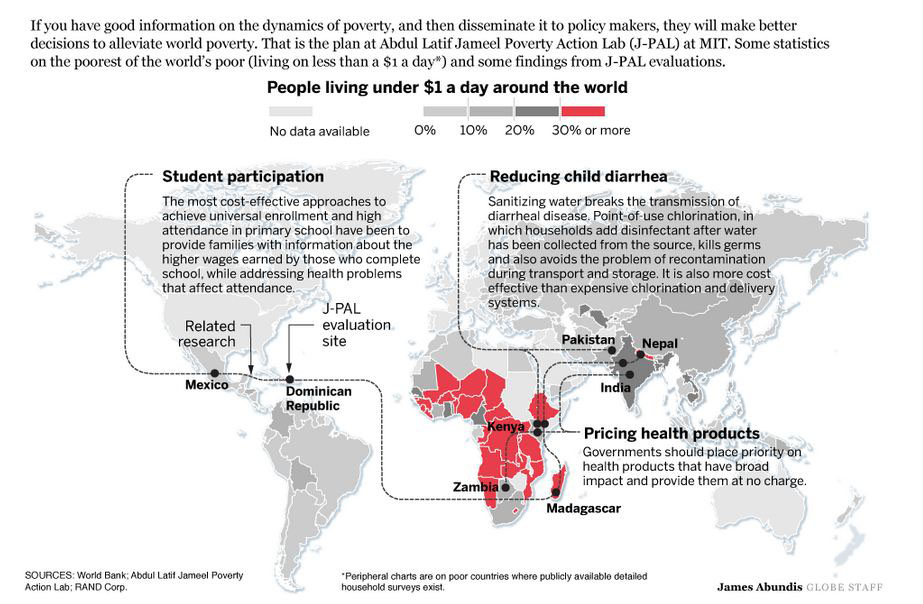Finding the pulse of the poor
Armed with data, an MIT lab offers fresh insight on some of the world's most vexing problems
IPA's partner organization, J-PAL, is featured in the Boston Globe highlighting IPA Research Affiliates Esther Duflo and Abhijit Banerjee.  Paired with an interesting infographic, the article brings more attention to evidence-based development and research that has followed the publication of Duflo and Banerjee's Poor Economics.
Paired with an interesting infographic, the article brings more attention to evidence-based development and research that has followed the publication of Duflo and Banerjee's Poor Economics.
Excerpt:
It's no one's idea of an MIT laboratory: not a beaker or an oscilloscope in sight. But in a wood-paneled suite, on the third floor of a bland, concrete building, researchers are tackling problems as complex and vexing as any in technology, science, or medicine.
This is the Abdul Latif Jameel Poverty Action Lab, or J-PAL, where economists through precise, detailed studies are trying to find ways to alleviate poverty. For nearly a decade, MIT economics professors Esther Duflo, and Abhijit Banerjee, have worked with a global network of researchers to conduct experiments in the world's poorest places - where families live on less than $1 day - and reached conclusions that are changing the way economists and policy makers think about development in impoverished areas.
The findings are contained in their new book, “Poor Economics,'' which earlier this month won the Financial Times and Goldman Sachs Business Book of the Year Award for “the most compelling insight . . . into modern business issues.'' In the book, the MIT professors argue that antipoverty policies must be built on evidence from careful, controlled tests that detail how the poor live, act, and react.
[...]
Duflo and Banerjee came to the study of global poverty from very different starting points. To Duflo, who grew up in a comfortable, academic family in France, global poverty was a remote abstraction. For Banerjee, abject poverty was as close as the ramshackle houses behind his childhood home in Calcutta. They met at MIT when Duflo, as a student, took a course in development economics from Banerjee. After Duflo earned her doctorate in 1999 and joined the MIT faculty, the two founded the Poverty Action Lab in 2003.
Since then Duflo, 39, and Banerjee, 50, have received multiple honors and prizes. In 2010, Duflo was awarded the prestigious John Bates Clark Medal for the best American economist under 40. The year before, she received a MacArthur Fellowship, the so-called genius award.
What inspires their interest in poverty, Banerjee explained, is the idea that the poorest people must deal with different conditions than the rest of the world's population.












